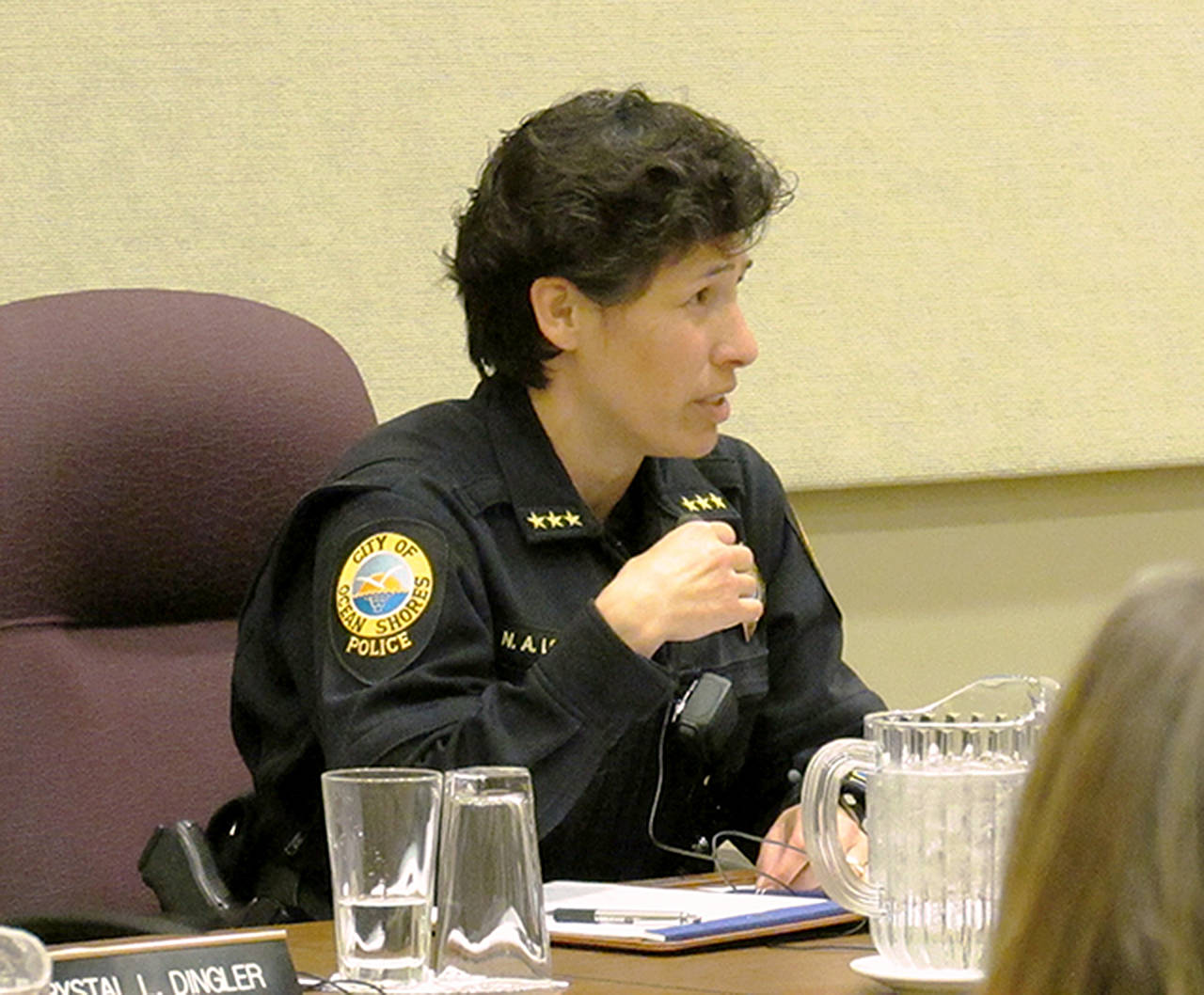Public safety issues in Ocean Shores were examined in detail from a multitude of perspectives Monday night during a special City Council study session.
Spurred by citizen efforts to address problems in the community over the past several months, the forum included updates on the local Block Watch group that was formed, as well as a report about a new Homelessness and Hunger ad hoc committee formed by the North Beach School District and city.
One of the key discussions was to what could be done to revise and update the Ocean Shores Municipal Code to take action against properties and property owners with continuing problems.
The idea is to strengthen the city’s ability to combat nuisance properties with a new section defining chronic nuisance properties and potential criminal penalties that can be imposed in addition to possible abatement issues.
Other issues were police staffing, code enforcement, and what might be proposed for law enforcement and public safety in the upcoming 2018 budget process.
One of the Block Watch leaders, Randy Peck, noted members are all verified property owners or renters, whose main function is to “observe and report” on problems and concerns in their neighborhoods.
“We’re not a vigilante group or anything of that nature,” Peck said, urging the Police Department to build back a community policing strategy where officers can be assigned to certain neighborhoods: “We used to have that and we’d love to have that back again. It’s just a matter of when we have the staffing and the department to do it.”
Peck noted there are 5,900 citizens in Ocean Shores, but only a maximum of 12 Police officers to cover the entire area with 12 square miles of homes.
“The realities are we have to work within the resources we have (as a city), and block watch is a resource that is very cheap,” he said. “It costs nothing. It is us helping each other. It’s your neighbor.”
The group has been posting Block Watch signs around the city where it is hoped would-be criminals “don’t come back to that area because they know people are watching.”
Police Chief Neccie Logan presented a revised version of the city’s current nuisance along with the new section on chronic nuisance properties developed by looking at several other cities under the suggestion of Peck and the Block Watch group.
On the existing ordinance: “We added a lot more to the definitions, which gives more clarity to the code enforcement officer on what he can do,” Logan said.
It also allows the city to abate a problem property at the owner’s expense. Other aspects includes language clarifying how many vehicles a property owner could have on the grounds — a maximum of four, which includes RVs but not vehicles stored in garages.
“Another big part is it gives the courts more guidance as to what they can do,” she added.
For chronic nuisance properties, the first violation would bring an infraction and fine, and the second violation within a 12-month period would be cause for a criminal violation. A property would be considered a public nuisance under the new section if there are three or more incidents there within a 60-day period or seven or more incidents in a year.
Logan acknowledged that crime is going up in the city, which currently is down to eight officers with three sergeants, and three unfilled vacancies.
“This is to get a step ahead of things, and to give officers a little more teeth,” Logan said of the suggested new ordinance proposals.
Most of the public and council members urged quick action on the proposals, but council members Holly Plackett and Jackie Farra seemed to be urging more caution.
“I wouldn’t want to live here, it’s like Nazi Germany,” Farra said.
Plackett was concerned about the process to move forward and argued against putting it on a future council agenda until it is further studied. She noted that under the ordinance, a property owner cannot keep a pile of building material on site, and she wanted a better definition of what an abandoned vehicle was. “I don’t want to be rushed. I want some more time on this,” Plackett said.
Later in the session chaired by council member Lisa Griebel, Mayor Crystal Dingler noted the ordinance update “really needs to be the priority.” Currently, the city has four properties in the abatement process: two on Edgewood Avenue and two on Rain Street.
Council member Jon Martin said he disagreed with Plackett: “I don’t think it’s something that should be on the back burner. I think it’s something we need to move forward.”
Tony James, a four-year resident, said there are a number of known “predator houses” in the area. “We know who they are and how they operate, depending upon who is in jail,” he said. “… Start at the top and get rid of those because they are the most obvious. You do represent us, no matter how small or how big our issues are … and waiting is just not going to work.”
School Board member Doreen Cato reported on the effort to address homelessness in Ocean Shores and North Beach, stating the ad hoc committee that was formed is beginning to gather information on just how widespread the problem and needs are locally.
Cato said the committee is planning to “develop a resource guide to be a link to the organizations and individuals where people can get help” as well as do a one-night count to “see who is out there” living in homeless conditions in our area.



